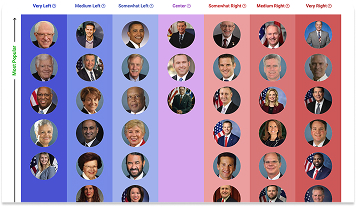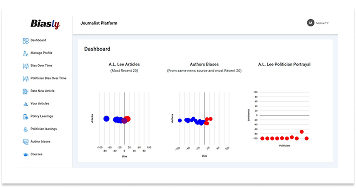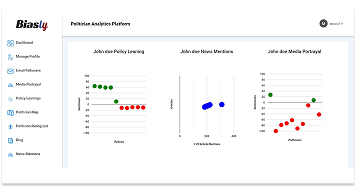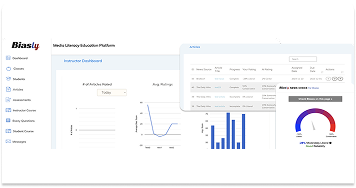Bias Meter
Extremely
Liberal
Very
Liberal
Somewhat Liberal
Center
Somewhat Conservative
Very
Conservative
Extremely
Conservative
-100%
Liberal
100%
Conservative

Biasly determines media bias ratings through a dual-layered approach combining artificial intelligence and analyst review. The platform’s proprietary bias detection engine, Bias Meter, evaluates sentiment, policy position alignment, and language framing across thousands of data points in news articles. Analysts then verify and interpret the AI’s findings, providing additional context where needed. Learn more
- Profile
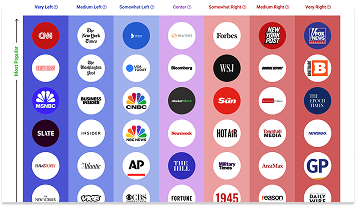
NPR on the media bias chart
NPR has a Bias Score of -18% Somewhat Left which is based on a variety of factors including its policy and politician leanings, article ratings, and the use of biased language. Its Reliability is rated as Good, and additional analytical insights are available in the other tabs.
- Bias Rating
-18% Somewhat Left
- ReliabilityPolicy Leanings
-16% Somewhat Left
Extremely
LiberalVery
LiberalModerately
LiberalSomewhat Liberal
Center
Somewhat Conservative
Moderately
ConservativeVery
ConservativeExtremely
Conservative-100%
Liberal100%
Conservative
Average Reliability
*Our bias meter rating uses data science including sentiment analysis, machine learning and our proprietary algorithm for determining biases in news articles. Bias scores are on a scale of -100% to 100% with higher negative scores being more liberal and higher positive scores being more conservative and 0% being neutral. The rating is an independent analysis and is not affiliated nor sponsored by the news source or any other organization.
Politician Portrayal97% negative
Continue For Free
Create your free account to see the in-depth bias analytics and more.
By creating an account, you agree to our Terms and Privacy Policy, and subscribe to email updates.
Log In
Log in to your account to see the in-depth bias analytics and more.
Policy Leanings Analysis
Policy | Bias score |
|---|
NPR Editorial Patterns
NPR’s coverage of political topics often reflects a Somewhat Left bias, with consistent patterns in phrasing, source selection, and thematic focus that are Lean Left. While the publication demonstrates journalistic standards in many of its reports, the choice of issues, framing, and word usage can indicate a political slant. This content analysis examines how NPR handles current issues in accordance with its bias rating. Bias may appear even unknowingly in articles, and it is important to analyze how NPR’s reporting of liberal and conservative issues differ within its published articles.
Coverage of Liberal vs. Conservative Topics
NPR’s articles include progressive social causes, such as abortion, anti-discrimination laws, and laxer border control, which tend to adopt sympathetic and supportive language. For instance, its coverage of these frequently aligns with liberal viewpoints, using inclusive and affirmative language to frame these policies as necessary reforms.
On the other hand, articles covering conservative figures or Republican-led initiatives often employ a more critical tone. Biasly’s analysis of recent NPR articles reveals a tendency to highlight opposition surrounding Republican policies, such as the Republicans’ general stance against abortion and more open immigration. For example, regarding dilemmas like anti-terrorism spending, Republican politicians who argue for more spending are criticized. In this, NPR’s bias rating becomes prevalent, as many articles on the topic often employ persuasive language to appeal to the reader’s emotions and convince them that the conservative ideology is incorrect.
This news media bias manifests in subtle ways, such as placing greater prominence on Democratic voices or using emotional diction when describing liberal causes. Words like “justice,” “freedom,” and “humanity” appear more frequently in liberal-oriented reporting, while conservative views are often framed as “inhumane,” “cold,” or “anti-immigration”.
Policy and Issue Framing
When covering immigration, NPR often references inclusivity, supporting movements for expanded legal protections. This aligns with a Somewhat Left media bias, especially so with its current viewership. Similarly, coverage of international politics reflects a perspective consistent with a slightly liberal narrative — often featuring voices from politicians, analysts, and activists in favor of peace-making legislation.
In contrast, issues like gun rights, border security, or lower taxation policies — typically associated with conservative platforms — are covered in a more critical tone. These stories are often contextualized through the lens of their impact on marginalized groups or framed as polarizing. This is in contrast to how NPR treats liberal policies, as those are often applauded and praised for helping those who need the most assistance.
Even in neutral coverage, phrasing choices shape perception. Articles will describe liberal proposals as “working for the people” or “civil rights”, while conservative legislation may be described as “restrictive” or “bigoted”. This consistent choice of words reflects an editorial direction that, even unintentionally, can contribute to bias in news media.
Coverage and Relevance
NPR focuses heavily on U.S. political affairs, covering federal elections, Congress, and major policy debates, while also offering international reporting, for instance, through its Morning Edition and All Things Considered programs. According to audience data, NPR reaches tens of millions weekly, and its funding and licensing structure (as a nonprofit that distributes content to over 1,000 public radio stations) makes it a distinctive model for studying media bias and source reliability.
Because of its reach and editorial structure, NPR provides a useful baseline for comparing how diction, framing, and tone vary across news organizations. Readers can use tools like Biasly’s Media Bias Chart to compare NPR’s coverage alongside other outlets
NPR Bias Analysis
NPR is a non-profit media organization founded in 1970 by the United States. The idea behind NPR was to provide a national public radio network that would provide in-depth coverage, cultural programming, and educational content to listeners around the country. Today, NPR is owned and operated by a network of member organizations and supported by listener donations, corporate sponsorships, and grants.
NPR covers a wide range of politics, business, science, arts, culture, and sports, and according to Similar Web, has an average of about 101,000,000 monthly visitors. When it comes to media bias, both AI and media analysts have evaluated its content, sources, and funding to determine its political leaning.
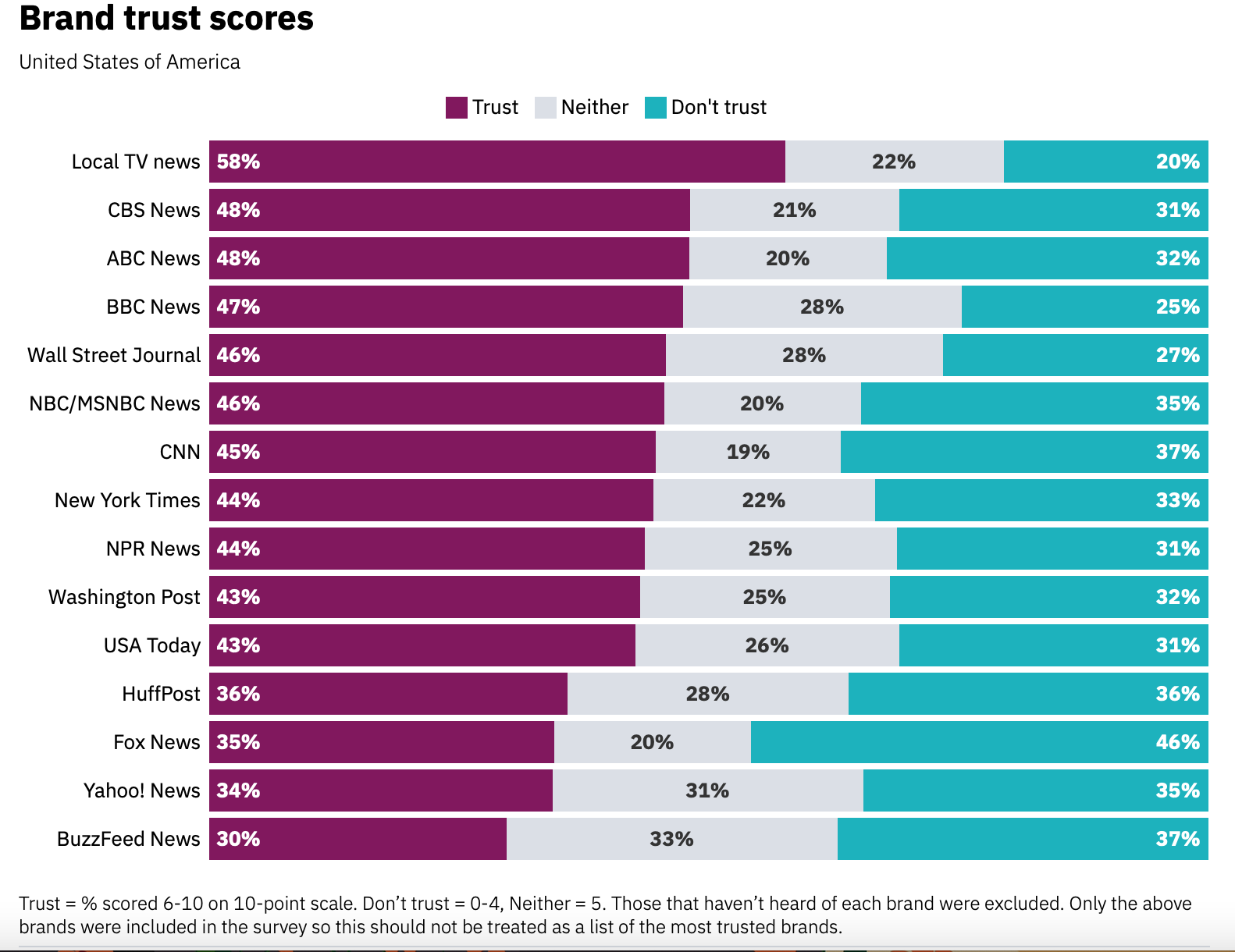
Source: Reuters
According to the Reuters Institute, NPR is the ninth most trusted news source in the United States. Readers’ trust in the accuracy of national news coverage may mirror the conclusions reached by NPR’s Biasly’s reliability rating. This article delves into NPR’s editorial tendencies to explore whether political bias is present and, if so, to what degree.
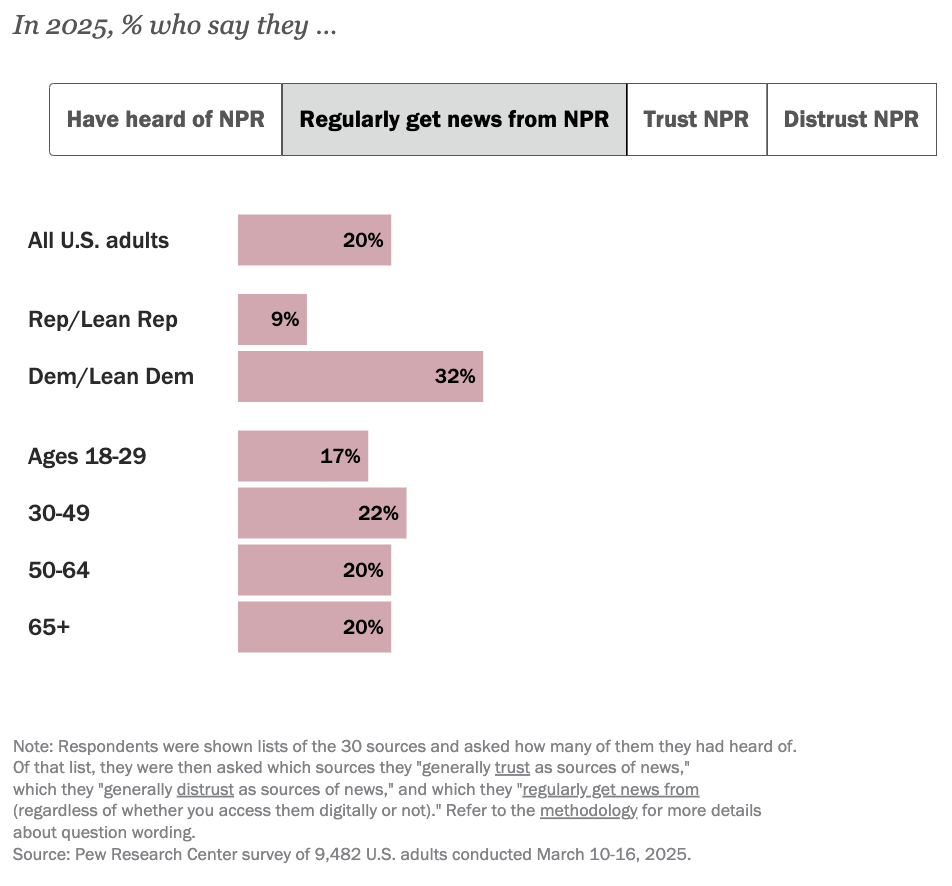
Source: Pew Research
As a rather large media outlet in the United States, NPR plays a role in shaping public perception. Readers’ trust in the accuracy of local news may mirror the conclusions reached by Biasly’s media bias ratings. This article delves into NPR’s editorial tendencies to explore whether political bias is present and, if so, to what degree.
Is NPR Biased?
Based on Biasly’s evaluations, NPR is rated as Somewhat Left.
By examining content patterns and the broader context of media influence, we aim to offer a balanced perspective on NPR’s political bias—and contribute to the ongoing discussion about bias in the news.
How Does Biasly Rate News Sources?
Biasly uses proprietary algorithms and a team of analysts to provide comprehensive bias evaluations across thousands of news outlets. Over 200,000 articles from more than 3,200 sources have been analyzed to identify the most accurate and unbiased stories.
Biasly assigns each outlet three key scores:
- Reliability Score – Reflects factual accuracy
- AI Bias Score – Generated via natural language processing
- Analyst Bias Score – Assessed by human political analysts
These scores are based on seven core metrics: Tone, Tendency, Diction, Author Check, Selection/Omission, Expediency Bias, and Accuracy. These elements help analysts and algorithms evaluate the political attitude conveyed by each article.
Biasly’s Bias Meter ranges from -100% (most left) to +100% (most right), with 0% indicating neutrality. The system evaluates individual articles based on political terms, policies, figures, and sentiment to calculate precise bias ratings.
Is NPR Politically Biased?
NPR earns a Somewhat Left rating for its AI Bias Score and a Somewhat Left for its Analyst Bias Score. The Analyst Bias Score is generated by reviewers from liberal, moderate, and conservative backgrounds. Analysts reviewed NPR articles and noted preferences in areas like coverage of liberal politicians and policy topics such as abortion rights and freer immigration policies. However, the paper maintained objectivity on topics like the Black Lives Matter protests and affirmative action.
For example, coverage on North Carolina’s new congressional map, the reporter mostly focuses on how redistricting will disenfranchise black voters and will bring new Republican congressional districts. While the article mostly maintains a neutral tone, it highlights how Republicans are redistricting for their own interests.
“Republicans have maintained they are drawing the new districts to help their political party.
“Republicans hold a razor-thin margin in the United States House of Representatives,” state Sen. Ralph Hise, who drew the new map with help from staff, told a legislative committee on Monday. “And if Democrats flip four seats in the upcoming midterm elections, they will take control of the House and torpedo President Trump’s agenda.”
NPR’s original intent presents a contrasting backdrop. NPR was initially created by the United States government as a national public radio service that would provide coverage to the country. However, as time has passed, it has begun leaning to the left. Biasly rates it with a Somewhat Left bias, despite it being a source managed by the government. All news sources tend to be biased in some way, but it is particularly striking that a government news source publishes articles with such a discernible bias.
NPR’s headquarters are in Washington, D.C., which could explain differing perceptions of NPR’s content. The paper may draw mixed reactions depending on readers’ political orientations.
This Bias score is determined through natural language processing that evaluates the tone, word choice, and opinion embedded in the reporting. Recent AI evaluations highlight liberal-leaning narratives in articles discussing the Republican Party and environmental issues.
Analysis of Bias in NPR Online Articles
NPR has found that in-depth coverage of the United States’ politics is one of the most effective ways to attract viewers. Given that much of its readership is liberal leaning, it’s essential to ask: Is NPR truly biased?
To evaluate this, we can analyze select NPR articles through several of Biasly’s bias rating criteria: Tone, Tendency, Author, Diction, and Expediency Bias.
- Tone: The overall attitude conveyed by the article
- Diction: Specific word choices made by the writer
- Author: The background and social presence of the journalist
- Tendency: Patterns of bias in the writer’s broader body of work
- Expediency Bias: Quick visual or textual indicators like headlines and photos that imply bias
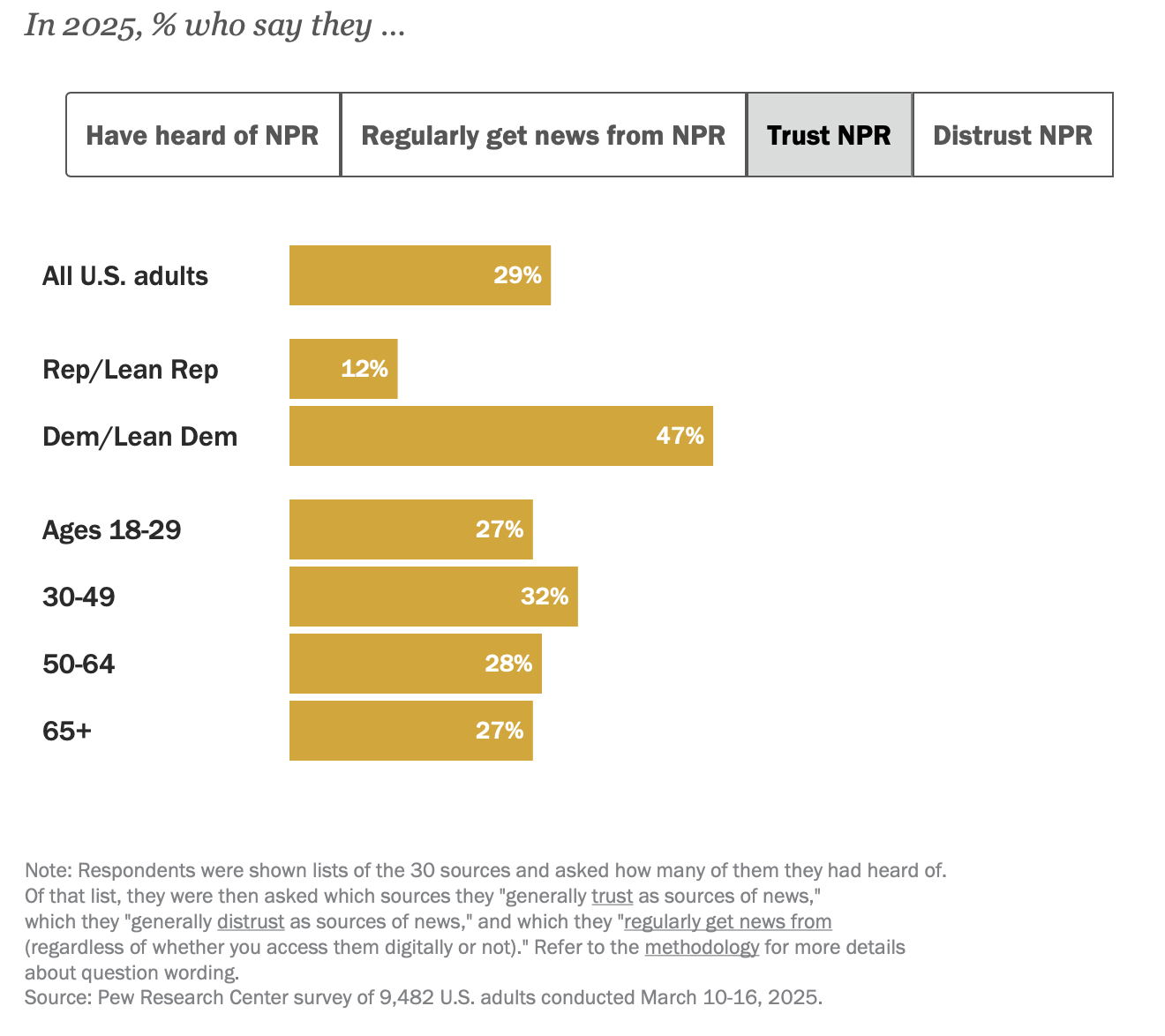
Source: Pew Research Center
According to the Pew Research Center, 29% of U.S. adults trust NPR as a source for news, and 58% of Americans have heard of NPR. So is NPR really biased? Let’s look at some articles in detail for any political slants.
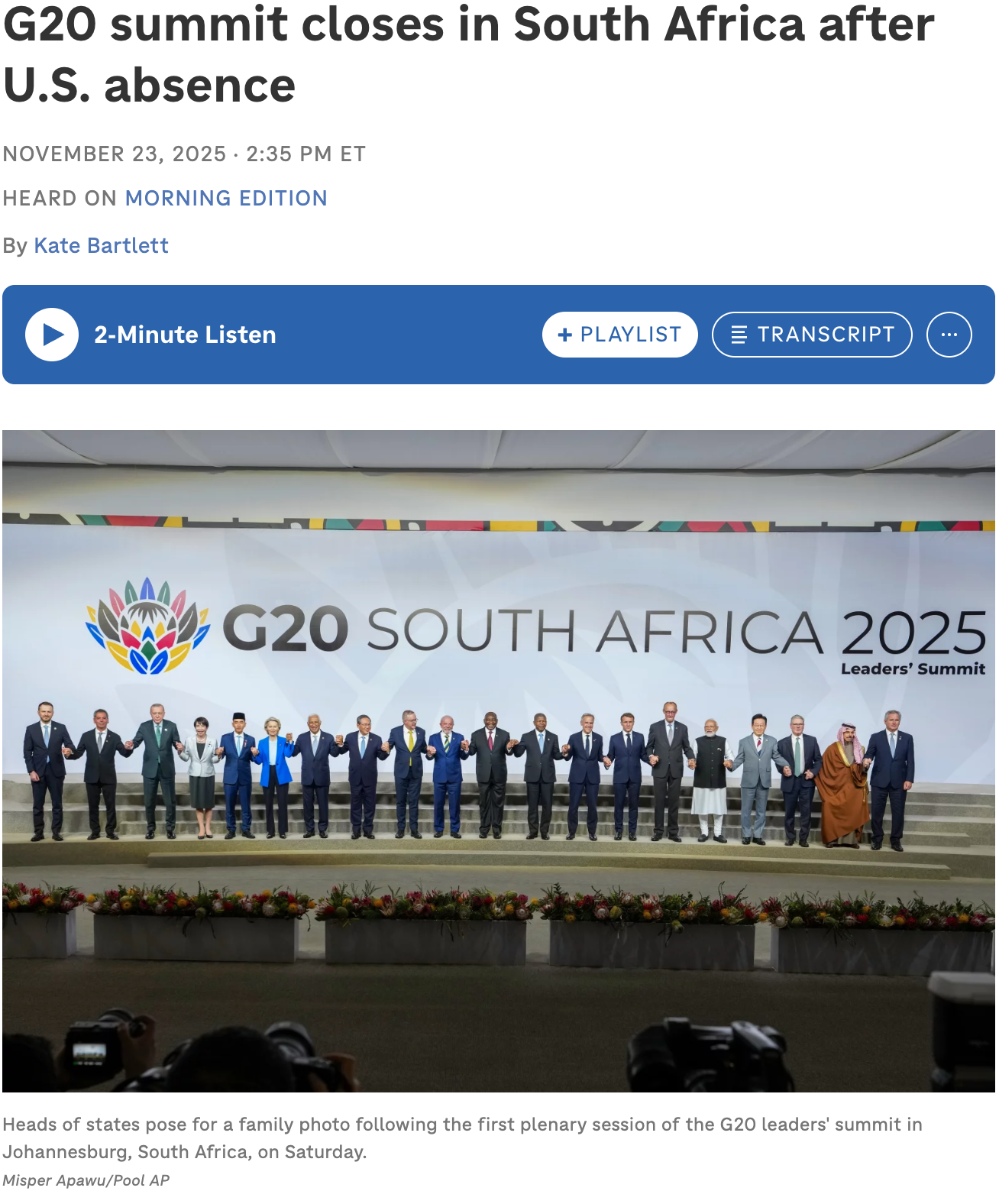
Source: NPR
One such article features a headline that draws a correlation between United States President Donald Trump and the G20 summit held in South Africa. Beneath the title, there is a photo of the Heads of State who were present, with the notable exclusion of President Donald Trump. The article begins with caution, explaining how this summit was strange because it is the first time a United States President has outright denied an invitation. This is a message likely to resonate with NPR’s liberal audience.
Reporter Kate Bartlett outlines the concerns raised by leaders in relation to the United States’ absence. For instance, European leaders had spoken negatively about the U.S.’s new peace plan for Ukraine. Another concern was raised by the Brazilian President, who was worried about the United States’ military actions in Venezuela. While this lends weight to the article, it also speaks only negatively about the United States’ choice, raising questions about objectivity.
“The Trump administration boycotted the event after Trump falsely accused the South African government of confiscating white-owned land and allowing the killing of white Afrikaners. The U.S. also objected to what it considered the summit’s DEI — diversity, equity and inclusion — agenda.”
The article leans progressive in its portrayal of Donald Trump as negative for refusing to attend the summit, reflecting social justice values. The author links the positive descriptions of South Africa’s Minister of International Relations, Ronald Lamola, to the negative ones of the United States. This aligns itself with left-leaning ideals, emphasizing moral leadership and advocacy. This framing, while uplifting, subtly situates the subjects within a progressive ideological lens, further underscoring the article’s ideological slant.
On the other hand, another article titled “U.N. climate talks end without agreement on phasing out fossil fuels” is slightly more balanced. It lays out the compromises achieved during the climate talks and the dilemmas that were left without a solution. Throughout most of the article, these are presented mostly factually, with additional input from several members in attendance. Phrases and diction like “plan of action,” “future summits,” and “concerns” reinforce neutrality. Hot-button issues like global warming are presented factually, without spin:
“The burning of fossil fuels remains the biggest driver of global warming. However, climate negotiators have struggled for years to agree on how countries should address the world’s reliance on those resources.”
The article employs diction and language that are notably restrained and formal, contributing to its overall neutral tone. Terms like “challenges” and “advocate” are informative but measured, conveying the dynamics of the climate talks without implying aggression or favoritism. The author also avoids emotionally charged words or loaded phrases often seen in more partisan outlets. Instead of framing the talks as “persuasion” or as a “fight”, she refers to them as a “talk” or “debate,” maintaining an even-handed tone.
In the article titled, “The federal government is still shut down. Here’s what that means in your community,” NPR remains objective in reporting. The reporters explain the reasoning behind the government shutdown and cover the opinions of both Democratic and Republican legislators. The article is unbiased in tone, and the language is very cut-and-dry, avoiding any emotionally charged language. Additionally, the reporters provide possible state-by-state impacts of the government shutdown. By giving both perspectives, the reporters stay even-handed and balanced.
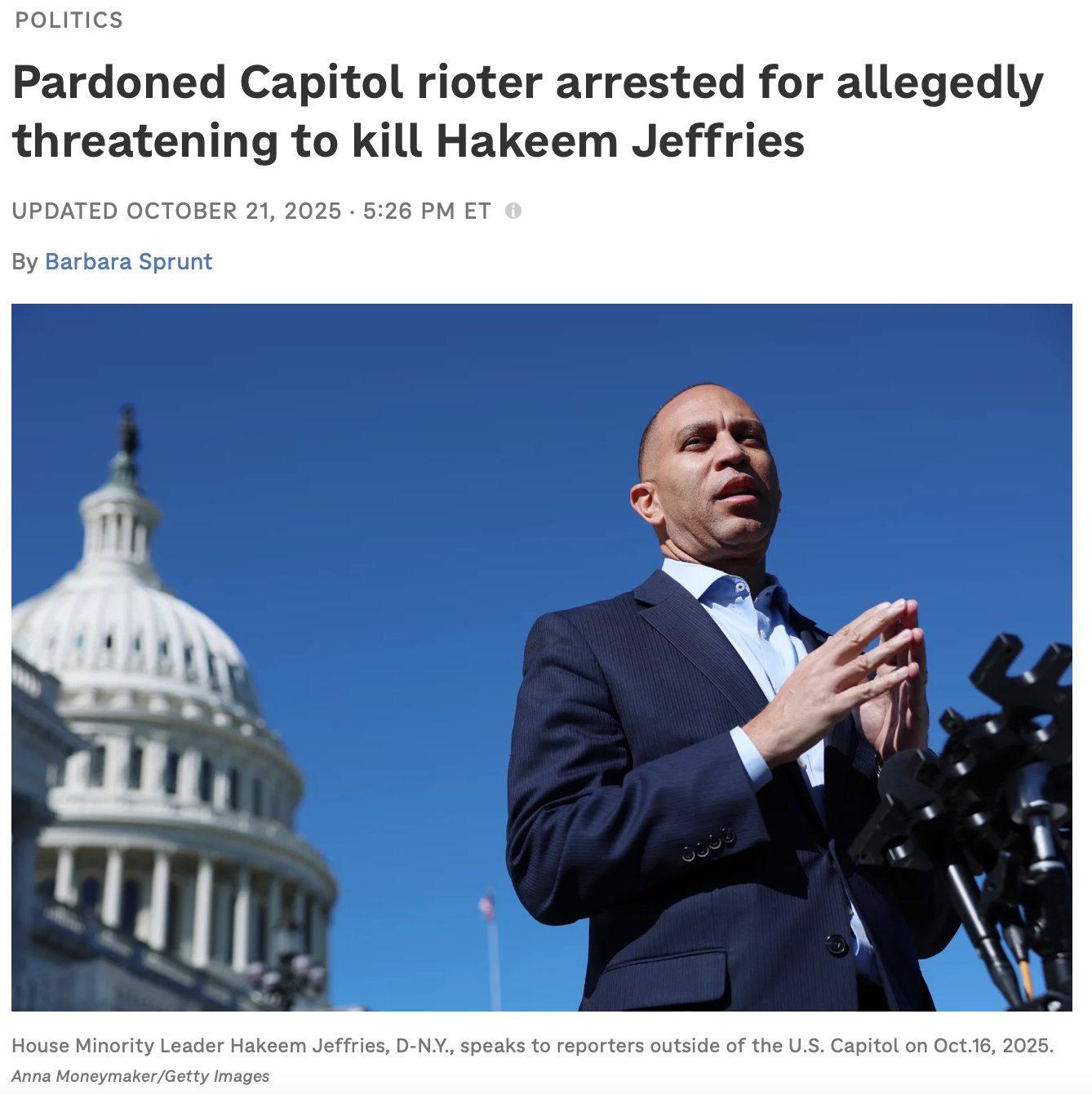
In another article titled, “Pardoned Capitol rioter arrested for allegedly threatening to kill Hakeem Jefferies,” Reporter Barbara Sprunt explains how a pardoned Capitol rioter was arrested for statements posted on social media threatening to kill U.S. House of Representatives minority leader Hakeem Jefferies. The pardoner rioter is facing a felony charge of making a terrorist threat. This article mentions no response from a republican legislator or official. This suggests a political slant. The Speaker of the House of Representatives, Mike Johnson, denounced the violence, but there is no mention of that in the article. The framing of this article highlights a liberal bias and can influence the reader’s opinion on Republican legislators.
Additionally, an article titled, As strikes on alleged drug boats grow, so do questions about their legality calls into question President Trump’s strikes on alleged drug boats. The reporters use language such as “unprecedented,” “legal justification,” and “without providing evidence” to highlight uncertainty around Trump’s actions. Moreover, the sources the reporters use either criticize President Trump or state that his actions are illegal. The quotes displayed in the article employ a harsh tone and emotionally charged language.
“What this boils down to is the president of the United States asserting a prerogative to kill people based solely on his own say-so,” said Brian Finucane, a former legal adviser for the State Department.”
The diction choices and source material suggest a liberal bias. Using neutral quotes and language could have balanced out the article. The criticism of President Trump displays a progressive slant on the article.
To sum it up, NPR shows inconsistent bias across its reporting. While the G20 coverage reveals a progressive slant by its negative framing of Donald Trump for his lack of participation, the U.N. climate talks article is more unbiased in the way that it provides context for the situation. Articles like the one about the government shutdown remain balanced in reporting with a neutral tone, unbiased language, and multiple perspectives from legislators. On the other hand, many articles like the capital rioter arrest reveal a progressive slant through framing and disapproving tones. Despite attempts at balance in some reporting, NPR’s tendency to highlight progressive initiatives and frame stories through a social justice lens indicates an overall left-leaning orientation, particularly when covering topics such as climate change.
Analysis of NPR Opinion Articles
To fully understand political bias in media, it’s important to distinguish between factual reporting and opinion pieces. While reporting aims to present facts and let readers form their own conclusions, opinion articles express personal viewpoints on current issues. Although the previous section examined factual reporting, this section turns to how bias surfaces through NPR’s selection and tone of opinion content.
One prominent example is the article titled “With U.S. leadership in doubt, can its allies chart their own course?” The title itself signals a persuasive tone and a clear alignment with progressive values. It implies dissatisfaction with the U.S.’s current leadership and questions whether its allies can manage without the United States’ assistance, suggesting that the author prioritizes persuasion over balanced information delivery.
In contrast, another opinion piece titled “Jane Goodall helped humans understand their place in the world” employs more centrist language. Its title does not lean toward any political side and frames the issue around a desire to honor Jane Goodall’s memory. The subheading is neutral and avoids emotionally loaded phrasing, indicating that the piece may be less ideologically charged.
The op-ed titled, “NPR’s veteran Pentagon reporter warns new media policy stifles journalism,” Reporter Tom Bowman condemns the Pentagon and Defense Department for the new ‘pledge’ required by journalists and news organizations in order to cover the Department of Defense. Bowman employs a critical tone and uses emotionally charged language statements like:
“That policy prevents us from doing our job. Signing that document would make us stenographers parroting press releases, not watchdogs holding government officials accountable.”
Bowman stated that the way the press operated in the DOD remained unchanged in previous administrations and has only held two briefings since President Trump came into office. This is indicative of a liberal bias because it highlights how democratic administrations have never attempted to censor news sources. Furthermore, the article does give the DOD’s reasoning for wanting journalists to sign the pledge. While it is an opinion piece, Bowman does not stay one-sided. He gives his own opinion, but still gives readers the chance to come to their own conclusions.
In another article about how “Trump’s tariffs affect Japan”, Reporter Robert Ward employs more centralist language. The article does not lean towards any political side and frames the issue around how Japan is going to try to improve its economy. Some of the sources used are a poll, an economic report, and journal, and the Ministry of Foreign Affairs of Japan. While the title of the article, “Why Japan sees President Trump’s tariffs as a ‘national crisis’”, can imply an emotionally charged article and criticism against President Trump, the article remains objective.
These examples show that while not all NPR opinion pieces are overtly liberal, the platform frequently publishes content that aligns with liberal media narratives. This consistent selection of opinion pieces can contribute to perceptions of systemic bias—particularly when the editorials predominantly support liberal views or causes.
This tendency underscores the importance of distinguishing subjective viewpoints from straight reporting, especially when interpreting the political leanings of any news organization.
How to Evaluate Bias
Although Biasly rates NPR as Somewhat Left, it’s important to remember that bias can vary from article to article. NPR also covers a large country with objectivity on many issues, from state legislation to social developments. This complexity underscores the importance of examining each article individually. So, let’s learn how to evaluate media bias.
Recognizing media bias requires awareness and critical thinking. Often, readers trust news sources that affirm their existing beliefs—a psychological tendency known as confirmation bias. This makes it harder to identify slanted narratives or one-sided reporting.
To combat this, it’s essential to challenge your assumptions by consulting multiple viewpoints and verifying news through third-party analysis. Tools like Biasly’s media bias ratings allow readers to compare the same news story across the political spectrum.
Ultimately, bias isn’t always a matter of what is said—it’s also about what is left out, how topics are framed, and which stories are chosen for coverage. Learning to recognize these patterns can help readers make more informed decisions and develop greater media literacy.
To start comparing news outlets and gain a better understanding of bias, sign up for Biasly’s Media Bias & News Analytics Platform to see how stories vary between sources.
NPR Reliability Analysis
Is NPR Reliable?
NPR finds itself on the upper end of the spectrum, with a reliability rating of Good. Its status as a government-owned news outlet contributes to its good reputation for reliability. According to Pew Research, more than half of Americans have heard about NPR at some point in their lives. In fact 56% of all U.S. adults have heard about it in some way. The distribution between Democrats and Republicans lies equally as distributed, with a slightly higher percentage of Democrats who report being aware of NPR.
This suggests that NPR’s popularity among United States residents may stem from the reliability of its political news coverage. Further investigation is needed to determine whether bias or other factors are affecting its accuracy. At Biasly, we specialize in evaluating not just bias but also the reliability of media outlets. Let’s explore the accuracy and trustworthiness of NPR.
How to Evaluate Reliability?
Reliability refers to how trustworthy or accurate a news source is. If we can’t trust what we read, then continuing to consume content from that outlet serves little purpose. So how do we evaluate a news outlet’s reliability?
There are several potential measures of reliability to look out for when trying to determine whether a media source is reliable or not. Red flags for an unreliable article can include the presence of wild, unsubstantiated claims, facts dependent on other unreliable sources, heavy use of opinionated language, and more. In contrast, hallmarks of a reliable source include:
- Absence of subjective language
- Citing credible sources (e.g., .gov, .edu, academic references)
- Verifiable facts and statistics from multiple outlets
- Use of primary sources, like interviews or transcripts
- Consistency with coverage across other platforms
Biasly’s reliability scores incorporate these elements in evaluating media outlets.
So How Does NPR Fare in Its Reliability?
The political reliability index developed by Biasly assesses both accuracy and trustworthiness. NPR currently holds Good Reliability Score, which is calculated as a weighted average of:
- Fact Analysis Score – Evaluates the accuracy of claims, facts, and evidence.
- Source Analysis Score – Assesses the number, diversity, and credibility of sources and quotes used.
NPR’s Source Analysis Score is Average at 57% Reliable. This suggests moderate trustworthiness in its sourcing practices. The score is AI-generated and considers quote length, frequency, diversity, and quality.
The Fact Analysis Score of NPR is Good at 74% Reliable. This further shows how well NPR supports its claims, addresses selection and omission bias, and presents verifiable evidence.
While NPR leans toward factual reporting, occasional lapses—such as unbalanced viewpoints or incomplete data—can affect its reliability rating. These nuances emphasize the importance of analyzing individual articles.
NPR’s Accuracy and Reliability
According to Biasly’s analysis, NPR maintains Good Reliability Score, but individual articles may vary significantly. Let’s dive into the details.
Political orientation plays a crucial role in how audiences perceive reliability. NPR has been accused of favoring a liberal narrative, potentially at the expense of factual reporting. To validate such claims, it’s essential to analyze whether the publication backs its assertions with sufficient evidence and diverse viewpoints.
Two common types of bias that affect factuality include:
- Selection Bias – Highlighting or omitting stories to fit a particular narrative.
- Omission Bias – Leaving out differing perspectives or relevant details to skew perception.
Biasly’s accuracy ratings use a scale from 1% (least accurate) to 100% (most accurate). Factors include the presence of supporting evidence, internal and external reliable sources, and balanced viewpoints.
For instance, Biasly gave Reuters a Center Bias and a Good Analyst Reliability Score. One Reuters article, titled “Canada says it will resume US trade talks ‘when appropriate’”, showed an Average reliability rating for failing to include diverse viewpoints and for not using varied sources. Passive-aggressive language towards Donald Trump was used in quotes from Canadian Prime Minister Mark Carney, and reporter Olivia Kumwenda-Mtambo failed to complement her selection of quotes from the Canadian side with any from the United States. In contrast, another piece from the outlet, titled “Ukraine to meet US in Switzerland to discuss ending war” featuring legal and political sources with balanced quotes, was rated as Center and scored Good for accuracy.
We will take a closer look at more examples like this below to provide a further investigation into the reliability of NPR’s articles. This will include its use of selection bias, omission bias, and the quality of its sources and the facts it uses.
Analysis of Reliability in NPR’s Online News Articles
NPR aims to serve United States residents with objective, fact-based reporting. Its staff includes writers from varying ideological backgrounds, which can help balance coverage. However, readers should distinguish between news reporting and opinion pieces to evaluate credibility effectively.
One notable example is the article titled “Two National Guard members shot in D.C., suspect is in custody, authorities say”. Reporter Juliana Kim covered the injury of two National Guard members in D.C., and uses posts from several politicians to explain the situation. The article refrains from editorial commentary, sticking to quotes and fact-based language. Despite NPR’s Somewhat Left rating, this piece illustrates factual neutrality.
Another article titled, “Effort to pay at least some federal workers fails in Senate.” Reporter Sam Gringlas covers a recent measure to pay federal workers during the government shutdown. The article refrains from editorial commentary, sticking to quotes, an impartial tone, and fact-based language. This piece illustrates factual neutrality despite %SOURCE_NAME%’s %SOURCE_BIAS_RATING% rating.
Quality of Sources and Facts Used
NPR often uses credible sources from across the political spectrum. However, some articles skew in how comprehensively they present opposing viewpoints.
Consider the headline: “U.S. to cut ties with Boy Scouts. And, Comey and James’ criminal cases dismissed”. While well-documented and supported by data and legal references, the article lacks insight into the opposing perspectives on most of the issues that are discussed. This absence creates a perception that the only right opinion is the one expressed by the author.
Readers cannot find evidence opposing the claim made in this article. Brittney Melton, NPR’s reporter, remains focused only on her point of view when regarding the first paragraph about Scouting America, the organization formerly known as the Boy Scouts.
“In a draft memo to Congress, he criticizes Scouting for being “genderless” and for promoting diversity, equity, and inclusion. The military has supported the Scouts for over 100 years, and formalized their relationship in 1937.”
There is no perspective from Scouting America seen, and no mention of their reaction to Hesgeseth’s claim. This lack of information gives readers the impression that the bill in question had no grounds for being passed, despite gaining a majority vote.
In contrast, the article “New limits on school loans could narrow physician and nurse pipeline, educators warn” maintains slightly more objectivity. It features multiple educators and politicians with differing perspectives. There is some editorial slant within the article, but most of it remains fact-based. This allows readers to interpret the differences in thought on their own.
The article gains credibility through its 16 quotes from political candidates—13 long and 3 medium-length. These quotations strengthen reliability by providing full context and minimizing misrepresentation, offering readers a more authentic and trustworthy account from primary sources.
The article features over seven sources, primarily educators and those working or who have worked in the field of healthcare. While the ideological range is largely limited to a negative perspective on the limits of the loans, it includes some internal diversity. This internal diversity is reflected in the contrast between the largely negative perspectives and the more supportive views expressed by Donald Trump and Elle Keast.
- Vineet Arora, Vice Dean of Education at the University of Chicago Pritzker School of Medicine
- Atul Grover, former policy member of the Association of American Medical Colleges
- Association of American Medical Colleges
- Elle Keast, Department of Education Press Secretary for Higher Education
- Jennifer Menik Kennedy, President of the American Nurses Association
- Vincent Guilamo-Ramos, Executive Director of the Institute for Policy Solutions at Johns Hopkins School of Nursing
- Donald Trump, current President of the United States
The article accurately reflects what a portion of healthcare educators are worried about with the upcoming student loan cuts. Controversial statements—such as claiming the President is wrong for cutting DEI programs—are presented as-is, leaving room for reader interpretation.
The article primarily relies on primary sources, which are highly valid and enhance its reliability. Given its focus on the future effects of the new limits on school loans for aspiring healthcare professionals, including perspectives from educators, helps improve the article’s reliability. However, this actually leads to more bias within the article, as the perspectives are then slightly skewed.
Another headline: “It’s the deadliest year for people in ICE custody in decades; next year could be worse.” The article is well supported with quotes from people who have worked for or with ICE, lawyers, and a current detainee. The reporter gains credibility through extensive research and credible information. The article features 12 sources, including:
- Data from the U.S. immigration and Customs Enforcement
- Death Reports from the U.S. immigration and Customs Enforcement
- S. Customs and Border Protection
- Office of Inspector General
The article explains the conditions of detention centers and how they may be worse due to the increase in detainees. The article mostly relies on reports from ICE and accounts from former employees, which enhances its reliability because of the firsthand accounts.
There is also a graph that highlights to readers why this increase in deaths during ICE custody is concerning, and 10 extensive quotes that explain the conditions of ICE facilities. A response from ICE would enhance the reliability of this article. However, they did not respond for immediate comment. The sympathetic tone and understanding language can suggest a progressive slant, but the sources coming directly from the institution the reporter is investigating help balance out the article.
Another article titled “Mamdani’s rise in NYC reflects a generational fight within the Democratic Party” relies on quotes from both Andrew Cuomo and Zohran Mamdani and polls as evidence for the article. Additionally, the reporter uses two political analysts to explain what is and isn’t working for Cuomo and Mamdani, and what’s pulling voters to support either candidate.
Furthermore, the reporter gives the opinion of Republican candidate Curtis Silwa, giving a different perspective on the two candidates. Another perspective and an explanation of what drives the support for either candidate increases reliability because it gives readers information to make their own decision on the Democratic and Independent candidates for the NYC mayoral race.
Selection and Omission Bias
NPR provides extensive coverage of the United States’ political climate, which is reasonable considering that it is a government-owned source. However, bias may still emerge through framing and story selection.
In “The DOT says it wants to make trucking safer, but some see an ‘immigration raid’”, selection bias surfaces through the article’s emphasis on negative aspects of Republican legislation. The article does not explore positive initiatives led by the current administration, nor does it present contrasting viewpoints. Still, it remains rooted in verifiable quotes.
The article does not highlight any proactive or positive measures taken by GOP leaders in the area of transport. Therefore, the article leans slightly left in its framing. The author addresses the regulations as a negative thing, from the perspective of Harjinder Singh’s case and Pawat Singh’s business. That said, the reporting is still grounded in verifiable facts and quotes for the most part.
By comparison, the article “National Guard shooting suspect served in CIA counterterrorism unit, group says” shows a stronger balance. Reporter Brian Mann includes quotes from CIA officials and other officials who are investigating the case as it unfolds. A notable example of left-leaning bias comes from a source quote:
“Patel also said, without providing evidence, that Lakanwal was allowed into the U.S. by the Biden administration without proper vetting. Patel blamed “the failure to vet any way, in any way, shape or form, this individual and countless others.”
Mann uses an extensive number of sources to give the reader a complete overview of the situation. The article integrated quotes from the CIA director John Ratcliffe, the FBI director Kash Patel, and the organization AfghanEvac. AfghanEvac both condemned Lakanwal’s actions and defended the Afghan community in the United States, stressing that this incident does not represent them. Overall, Mann used a well-rounded approach to delivering unbiased news to readers of NPR.
In “Trump uses ‘common sense’ to make a political point,” Danielle Kurtzleben tries to remain objective. Kurtzleben explains that many politicians have used ‘common sense’ to make a political point. The article uses two examples of former President Obama and Representative Alexandria Ocasio-Cortez (D) using ‘common sense’ on their policy issues. Kurtzleban explains, however, that when President Trump uses the term, it has a different meaning. A quote from Republican analyst Frank Lutz states:
“But as Luntz points out, it can also be a cudgel, especially in Trump’s hands.
“For him, common sense has an even broader meaning,” he said. “It’s not just that you’re right for the right reasons. It’s also that the other side is wrong for being ideological, for being political, or being outside the mainstream.”
Throughout the article, Kurtzleban does a good job of avoiding any emotionally charged language; however, multiple analysts stating that when Trump uses the term, it has a different, negative connotation is a hindrance to objectivity. Selection bias surfaces because when ‘common sense’ is used by a Democrat, it has a positive connotation. While NPR tries to maintain journalistic standards, this slight liberal bias is evident in the article.
Another article titled “Trump’s own version of reality continues to confound political actors and observers” fact-checks statements made by Trump during the 2024 presidential election campaign. However, the author doesn’t remain objective. He states how Trump has lied or kept up with conspiracies to benefit himself. In this article, selection bias surfaces by only highlighting Trump’s statements. Many other prominent politicians have said things to promote their own agenda. Highlighting other politicians may help round out the article. Also, language such as “disqualifying,” “not paying attention much to what he is saying,” and “hyperbolic superlatives” suggests a liberal bias, which hurts the author’s reliability. Using the word ‘confound’ also doesn’t help the argument. Especially since the author goes on to debunk claims Trump has made in debates and interviews.
When it comes to opinion pieces, it is important for readers to know that issues with factuality, sources, selection, and omission can come up frequently. The articles covered so far reflect NPR’s Somewhat Left views. However, this is not necessarily detrimental to NPR’s overall reliability. Its evidence may favor issues more towards the left, making it safe to assume it neglects issues in the United States that concern the right. Nonetheless, NPR maintains accuracy and tends to cite evidence directly from political leaders.
So, is NPR Reliable?
Overall, NPR can be considered to be an outlet that is very reliable. It demonstrates a consistent goal of journalistic integrity and typically supports claims with sources and quotes. Occasional omissions and framing bias do appear, particularly on culturally sensitive or partisan issues.
As media literacy improves, readers can more easily detect issues with selection bias, omission bias, and factuality. To strengthen your ability to assess reliability across the political spectrum, use Biasly’s News Bias Checker to compare how multiple outlets report the same story.
This empowers you to consume more accurate, balanced, and dependable news.
Funding and Ownership
Who Owns NPR?

Source: Wikimedia
NPR is a national nonprofit media outlet created by the federal government in 1970. NPR has hundreds of local member stations across the country that pay to license NPR content, such as ‘All Things Considered’. A majority of NPR revenue comes from corporate sponsorships; however, NPR does receive part, ~10%, of its revenue from federal, state, and local governments. Katherine Mahler has been the president and CEO since March 2024.
While NPR strives for objectivity in its reporting, complaints of liberal bias have persisted since its inception. In 2000, NPR hired a left-wing and right-wing ombudsman to watch for bias in an attempt to quell public concerns. Unfortunately, this did little to curb public sentiment, and conservative politicians, as recently as Trump, have attempted to defund NPR.
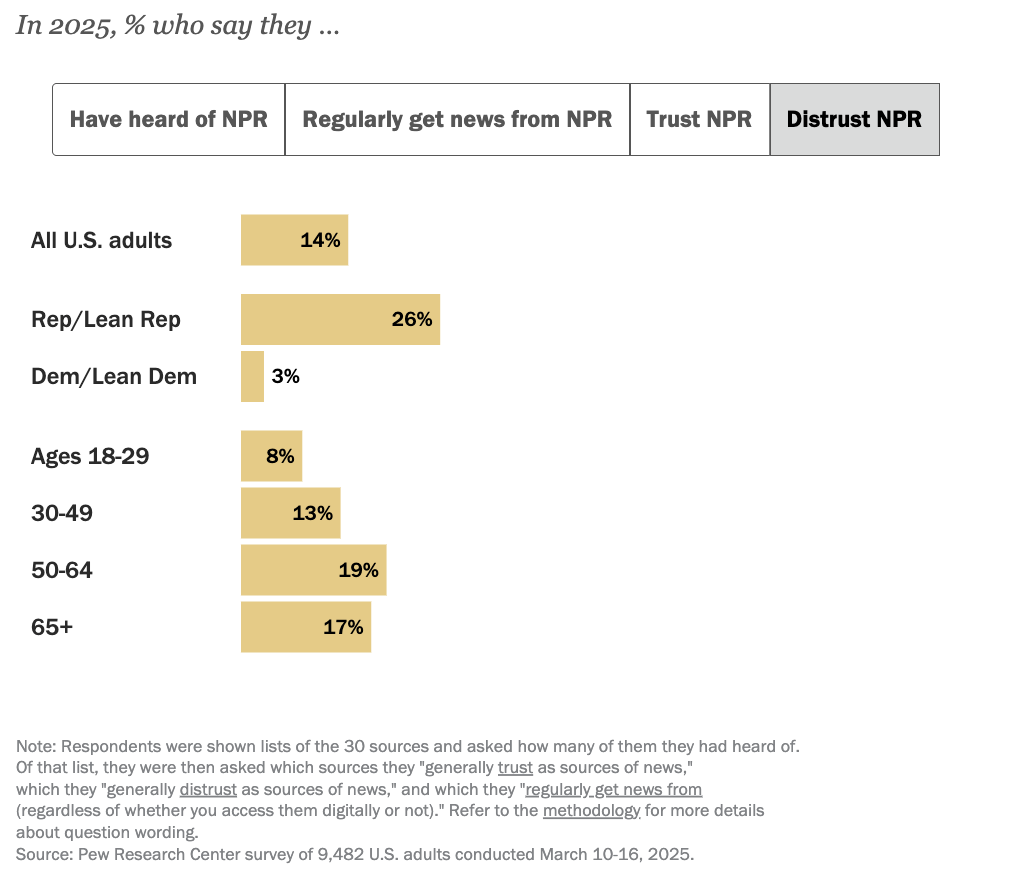
Source: Pew Research
Under its current nonprofit structure, the newspaper’s editorial board operates independently of its newsroom. This reinforces the paper’s public commitment to transparency in journalism, helping ensure that financial contributions do not bias editorial content. While some biases may still arise due to staff perspectives or editorial practices, they are not easily attributed to external funding.
This nonprofit approach may provide added reassurance to readers seeking a news outlet that values independence and editorial integrity.
Who Funds NPR?
NPR is owned and operated by the United States government, in association with many member stations across the country. The outlet started as a nonprofit company in 1970 and has remained that way until today.
Today, it solicits reader contributions and philanthropic support through its membership portal. Its funding now comes primarily from corporate sponsorships, though a portion of its funding does come from federal, state, and local governments.
Additional Insights
News Source Comparison
When it comes to news source comparison, NPR is often evaluated alongside other regional and national outlets that lean left or center-left. Sources like The Guardian, MSN, or Bloomberg often present similar tones and editorial philosophies. NPR maintains a Somewhat Left media bias, as it sometimes lacks opposing perspectives within its articles. It strives for coverage balance in the whole of the United States.
This puts it in contrast with more neutral outlets that present consistently unbiased narratives without factual counterpoints. Readers seeking balanced political coverage may compare NPR’s framing of issues with outlets rated as Center or Lean Right on our Media Bias Chart, or explore other papers on our Similar Sources page.
Notable Contributors and Authors
NPR features a diverse range of reporters and columnists, many of whom are deeply familiar with the United States’ political and social climate. Reporters like Kate Bartlett, who frequently covers environmental matters and international relations, exemplify the outlet’s strength in investigative journalism.
Other contributors focus on healthcare, immigration, or civil rights—topics central to the United States’ political world today. While some contributors may be seen as leaning left in tone or topic selection, their work is generally grounded in factual reporting. The presence of recurring bylines helps readers evaluate individual journalists’ bias over time.
Related Tools and Resource Pages
To better understand how NPR fits into the broader media landscape, we recommend exploring these helpful resources:
- Media Bias Chart: See where NPR ranks among hundreds of media outlets across the political spectrum.
- Political Bias Chart: Visualize political slants of news sources across various policy areas.
- Journalist Bias Analytics Platform: Explore how individual journalists contribute to bias within their publications.
- Politician Bias Analytics Platform: Compare how politicians are framed differently by NPR and other outlets.
- Media Literacy Education Platform: Learn how to critically assess media sources, bias techniques, and news reliability.
Frequently Asked Questions
NPR is rated as Somewhat Left based on Biasly’s media bias algorithm, which assesses sentiment, article framing, and policy favorability.
Yes, NPR has faced occasional accusations of misinformation and bias, including claims from political commentators and government officials that its reporting lacked neutrality. Some of them alleged NPR for improper framing of taxpayer funding and political coverage. One such example can be found here. NPR responds to some of these claims, one such example being this.
Biasly uses a combination of AI sentiment analysis and human analyst review to assess tone, fact accuracy, source quality, and media bias indicators. Learn more on our Bias Meter page.
Generally, yes, though partisan framing and selective reporting can affect perceived reliability.
Ratings are based on recent news using data science and A.I. technology.
Military Spending
| Date | Sentiment | Associated Article | Snippet |
|---|---|---|---|
| 08/25/2019 | 75% For | Trump Family Detentions Flores Agreement (link) | So, of course, the Trump administration is doing the opposite in a baldfaced |




























